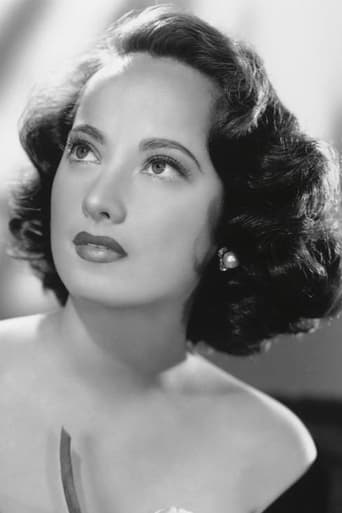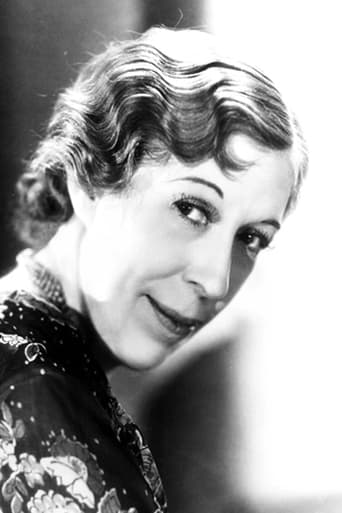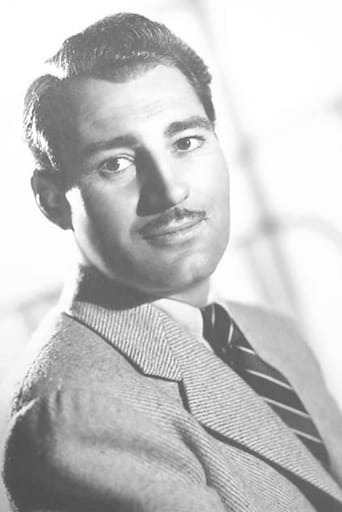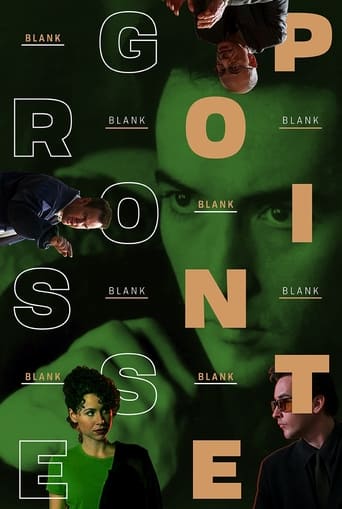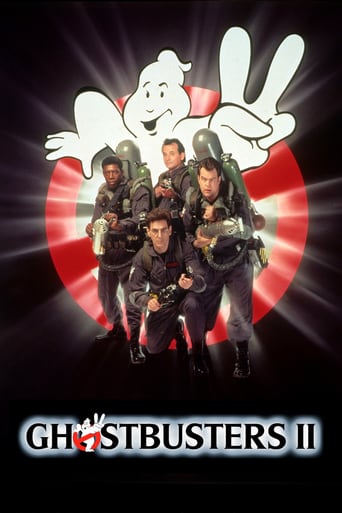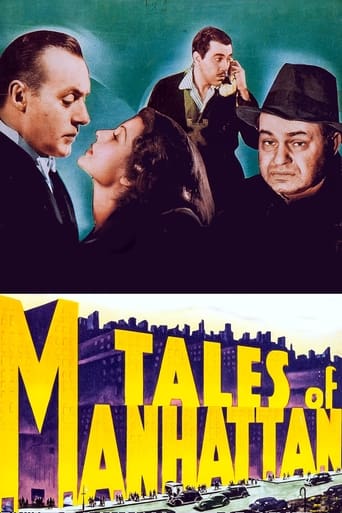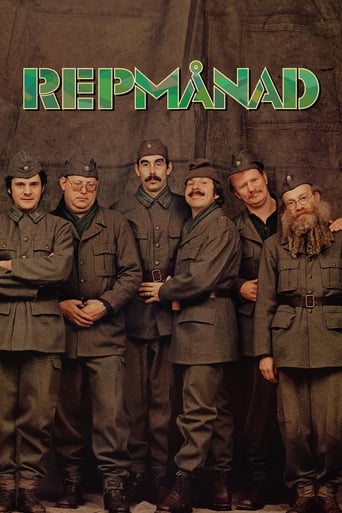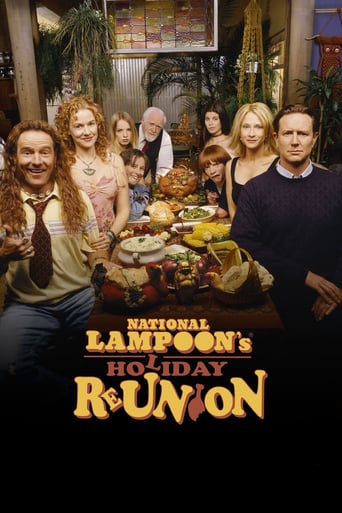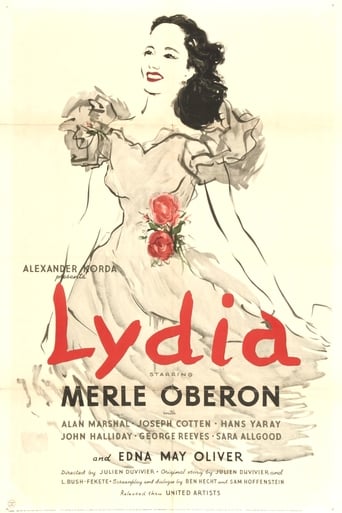
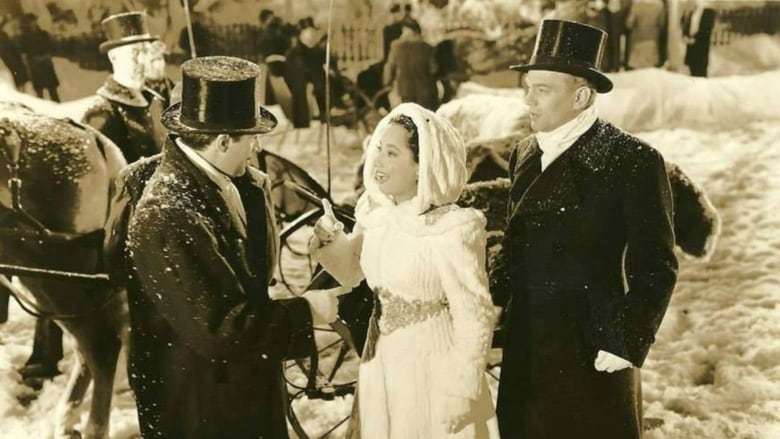
Lydia (1941)
Lydia MacMillan, a wealthy woman who has never married, invites several men her own age to her home to reminisce about the times when they were young and courted her. In memory, each romance seemed splendid and destined for happiness, but in each case, Lydia realizes, the truth was less romantic, and ill-starred.
Watch Trailer
Cast
Similar titles

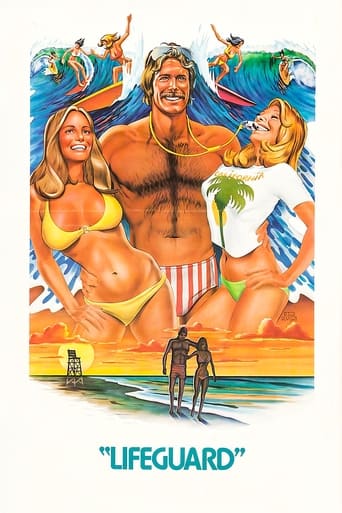
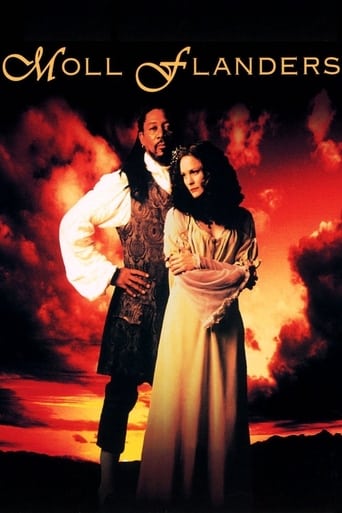
Reviews
Very very predictable, including the post credit scene !!!
One of my all time favorites.
Don't listen to the negative reviews
I enjoyed watching this film and would recommend other to give it a try , (as I am) but this movie, although enjoyable to watch due to the better than average acting fails to add anything new to its storyline that is all too familiar to these types of movies.
Intriguing plot about an old woman (Merle Oberon) reflecting on her youth, although the result is imperfect. The dramatics are the film's weak spot, as the plot is a quite contrived, especially concerning the orphanage for blind children. The camera framing and cinematography display flashes of technical ingenuity at various points throughout the film, such as when Lydia and a local fisherman share a conversation against the backdrop of a fireplace. An early flashback's evocations of the bliss and idyllic nature of memories offer a remarkably fresh take on nostalgia. Sadly, these flashes of creative ingenuity are few and far between, and Oberon, who I've never been a huge fan of, is very touching and insightful while playing the older Lydia. Ruminative and able to find humor in the way her life has unfolded, she does a great job of reflecting on her life as an extremely successful woman who has sacrificed romance in her path to greatness. Unfortunately, she relapses to her usual shrill gracelessness for much of her performance as the younger Lydia, making her performance a wash on the whole. Edna May Oliver, in her final film performance, is a joy to behold in a signature tough-as- nails New England spinster role. She's hilarious (as usual) and oftentimes touching. The other supporting actors are uniformly dull and uninspiring, including Joseph Cotten, who I normally love, as one of Lydia's former loves. Overall, the film isn't as poignant and insightful as it might have been, given the storyline, which is disappointing. It's not exactly memorable outside of Oliver's performance, although it's not the worst movie I've seen and worth a viewing.
Merle Oberon stars in the title role of Lydia who seems to have all the young gallants of the turn of the last century just champing at the bit. But it's now 1941 and we meet Merle as an old spinster woman who is quite the well known public philanthropist. She never married, but not that didn't have plenty of chances.Four of her old beaus have gathered at the invitation of one of them Joseph Cotten who was the son of the butler John Halliday in the home where Oberon grew up. Cotten is now a respectable physician and the others he's invited are George Reeves a nightclub owner, Hans Jaray a blind concert pianist, and a sea captain Alan Marshal.Merle loved them all in her own way, but couldn't quite commit to any of them. All of them saw a different Merle in their salad days.I'm thinking that the film lost a great deal in translation from the original French movie Dance Program which was also directed by Julian Duvivier. It would almost have to be the case given the far stricter censorship that we had as opposed to the French.Lydia is entertaining and good enough and the cast performs their roles well. But the film is a bland romantic concoction, I'll bet the original French is much better.
When is a remake not a remake is one that will keep the pedants occupied long past my own bedtime and on the whole I'm content to let them pick the bones out of it whilst I savor and/or am disappointed by the latest example to find itself on a screen near me. You could argue that one of the clues is when a remake retains the Original title, Kiss Of Death, Ocean's Eleven, The Manchurian Candidate etc but then along comes The Ladykillers, which retains both title and approximate plot of the Ealing entry but then moves the action several thousand miles West by several decades forward leading pedants back to Square One. When they change not only the country but also the title the additional factors that come into play are 1) are you, as a viewer, aware of this situation and 2) have you seen the original. I suspect that anyone who saw Julien Duvivier's magnum opus Un Carnet de bal will be disappointed, to say the least, with Lydia which he made four years later (1941) in Hollywood, whilst those who never saw, or perhaps have never heard of Un Carnet de bal, will find Lydia vastly enjoyable - it is, after all, the work of a Great director, albeit one saddled with a 'revised' script that tends to turn the original on its head. For the record Un Carnet de bal featured a recently widowed lady who, more or less on a whim, decides to trace the men with whom she danced at her very first ball as a teenager and is, inevitably, disappointed at what she discovers. The action was, then, set largely in the present with an elderly lady encountering elderly men; this time around the lady in question is a spinster and is reminiscing with three of her old beaux in the present which means that, by definition, the bulk of the film is flashbacks to forty years earlier. Those with no knowledge of Un Carnet de bal will relish the initial ball scene with shades of both Max Ophuls in the swirling camera and Busby Berkely in the phalanx of art deco lady harpists, and the lush score by Miklos Rosza whilst those who have seen Carnet will feel keenly the absence of Louis Jouvet, Fernandel etc and gaze open-mouthed at the hopelessly inadequate substitutes of whom only Joseph Cotton makes even a half-decent fist. Mixed feelings then; on the one hand it's still a Duvivier movie, on the other, there's only ONE Un Carnet de bal.
An unexceptionable pleasure to the primary senses of the eyes and ears. This results from a combination of Oberon's lush eyebrows and the pillowy opulence one imagines from a director with a surname like Duvivier. The film is a 'refashioning' of his French-language 'Un Carnet De Bal' from 1937, in that the basic plot is Oberon's portmanteau recollection of 4 past loves. Cynics may understandably dive for the sick bags, but it's a pleasant surprise therefore to find that for all the typical Fox emphasis on visual scrumptiousness, this romantic opus turns out to be a narratively literate affair. It's lent considerable dramatic weight by an excellent cast, including an uncharacteristically unhistrionic Oberon.
